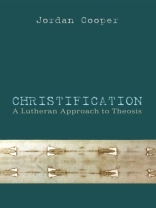The doctrine of theosis has enjoyed a recent resurgence among varied theological traditions across the realms of historical, dogmatic, and exegetical theology. In Christification: A Lutheran Approach to Theosis, Jordan Cooper evaluates this teaching from a Lutheran perspective. He examines the teachings of the church fathers, the New Testament, and the Lutheran Confessional tradition in conversation with recent scholarship on theosis. Cooper proposes that the participationist soteriology of the early fathers expressed in terms of theosis is compatible with Luther’s doctrine of forensic justification. The historic Lutheran tradition, Scripture, and the patristic sources do not limit soteriological discussions to legal terminology, but instead offer a multifaceted doctrine of salvation that encapsulates both participatory and forensic motifs. This is compared and contrasted with the development of the doctrine of deification in the Eastern tradition arising from the thought of Pseudo-Dionysius. Cooper argues that the doctrine of the earliest fathers–such as Irenaeus, Athanasius, and Justin–is primarily a Christological and economic reality defined as ‘Christification.’ This model of theosis is placed in contradistinction to later Neoplatonic forms of deification.
Sobre o autor
Jordan Cooper is the pastor of Hope Lutheran Church in Brighton, IA, host of the Just & Sinner podcast (visit http://www.justandsinner.com), and the author of The Righteousness of One: An Evaluation of Early Patristic Soteriology in Light of the New Perspective on Paul (2013).







![Capa do Brian Schrag & Julisa Rowe: Community Arts for God's Purposes [Chinese] 貼近神心意的社群藝術 Capa do Brian Schrag & Julisa Rowe: Community Arts for God's Purposes [Chinese] 貼近神心意的社群藝術](https://static.worldofdigitals.com/thumb_webp/740/9781645083740.webp)




